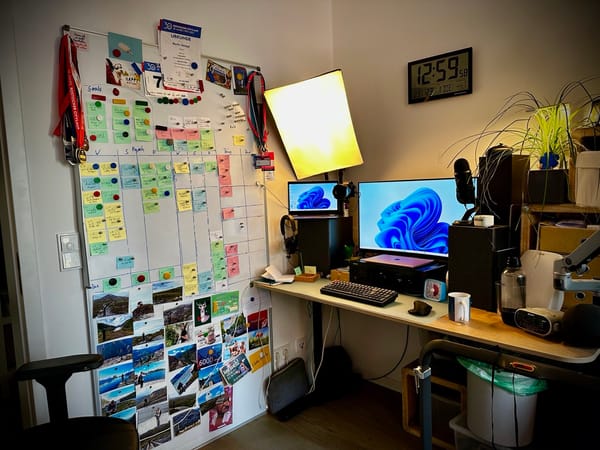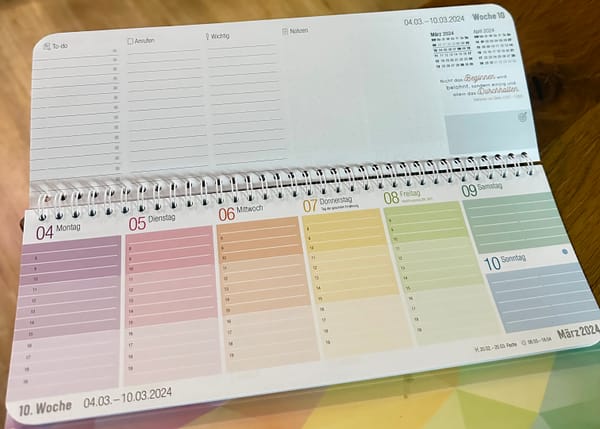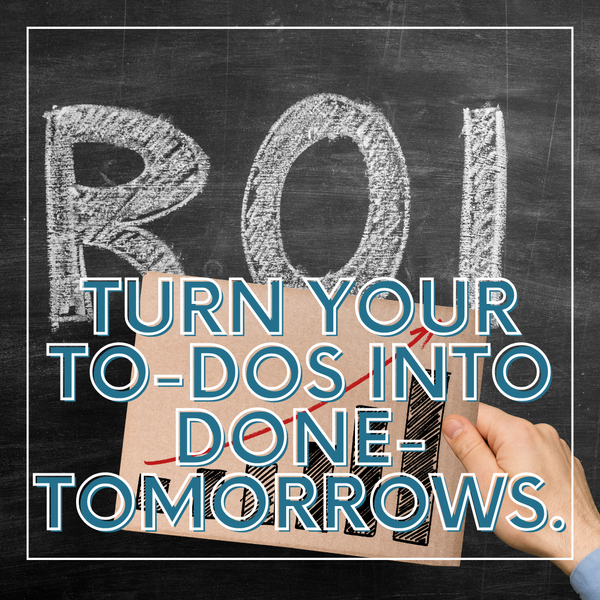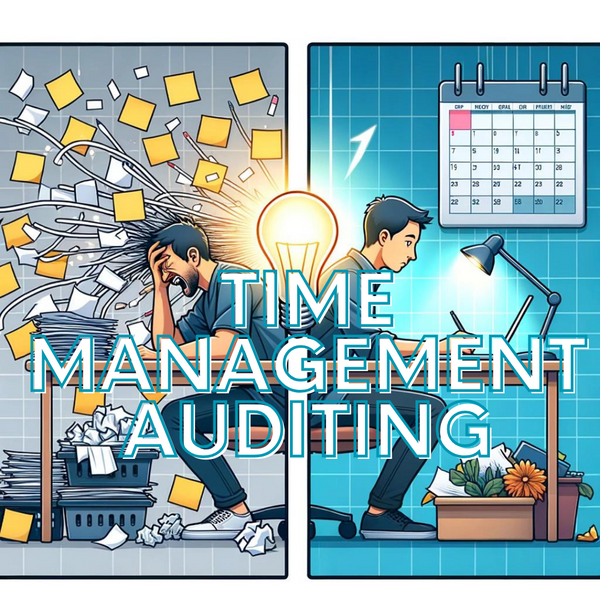Diligent Sunday #25: Finding Serenity
Change your thoughts about work, time, progress and how you present yourself to others. Find alignment of these terms with your self-chosen life responsibilities. This personal agenda will help you not to see work as work but as part of your life, which will help you feel more relaxed and authentic.

Introduction
Hello everyone,
Another week has passed, and 71% of the year is already behind us. You can feel autumn setting in in northern Germany, where I live. I rather enjoy it, as the summer sun kept luring me away from my desk. This has been a good thing, pushing me to enjoy walks and bike rides, which are beneficial for both my body and mind. On the other hand, several matters close to my heart were overlooked over the summer, both in my corporate job and my side business in content creation. For example, I should have launched my first product for Deliberate-Diligence.com in July. However, I never found the dedicated time needed to concentrate on it. I was outside too much, having fun in the sun or needing to focus on my corporate job.
Unfinished work weighs on the soul – I am sure you all can heavily relate. You’re aware of what needs to be done, and the longer you procrastinate, the heavier the mental burden of these uncompleted tasks.
In the past, these thoughts would send me into a frenzy of busyness. My wish was for a clean slate – a state where all tasks are completed, and I exist effortlessly.
The problem is: while it's possible to start with a clean slate in your teenage years or even during your studies, it's no longer possible after the age of 30+. This is because individual tasks transform into areas of responsibility that you must actively develop yourself. These can include roles such as being a father or mother, managing a corporate department, or simply pursuing your passions (travelling, art, writing, side businesses) for self-fulfilment.
If you are only a delegation recipient, you will eventually complete all current tasks and achieve a clean slate. However, if you are responsible for a life or work area, there is always something to do. Once one milestone is reached, the next one is already in sight. It's a never-ending game.
There are three ways one could approach this evolution from task handler to responsible owner:
- You accept this evolution and dive into the busyness hamster-wheel, driven by the faint hope of a clean slate.
- You resist the evolution of taking up responsibilities, ending up in a comfort zone - stress-free yet devoid of genuine progress.
- You accept both the evolution and the duties and opportunities that come with owning responsibilities and acquire a serenity which enables you to handle the endless dynamics of tasks and opportunities without burning out.
Option 1 is the status quo for many of my readers. Option 2 is likely not a possibility for you or me. Hence, learning serenity (option 3) remains our best choice.
So, today's 25th Diligent Sunday Newsletter will focus on Finding Serenity, which is the first step into the 3x3 Time Mastery frameworks I introduced last week.

I hope you'll enjoy today's issue!
Best regards,
-- Martin

"The key to life is not accumulation. It's about contribution."
- Stephen Covey
The Misconception That Leads to the Busyness Hamster-Wheel Trap
There are two main reasons why people end up in a cycle of perpetual busyness. As I mentioned earlier, the first reason is the assumption that taking on responsibilities will make life a never-ending to-do list. The second reason is the fear of death and the desire to make the most of our limited time.
These two elements lead us down the wrong path. It prompts us to fill our time with easy tasks like managing emails instead of tackling important work we're putting off, perhaps due to fear of failure.

"One cannot manage too many affairs: like pumpkins in the water, one pops up while you try to hold down the other." - Chinese Proverb
What is Serenity?
Serenity can be seen as a mindful state that involves several key elements:
- Conscious Acknowledgement of Time: Serenity involves the conscious acknowledgement of our time and the intentional choice of how we utilize it. We need not fill every moment with tasks and can focus on crucial, impactful activities.
- Self-awareness: To attain serenity, understand personal motivations and values and ensure all actions align with them.
- Acceptance: Serenity teaches us to calmly accept that we cannot do everything at once, allowing us to choose our battles wisely.
- Balance: Understanding the ebb and flow of life is crucial. Embrace periods of rest and productivity, and find peace in that balance.
- Quality over Quantity: Serenity underscores the importance of quality over quantity and depth over breadth.
- Response over Reaction: Shift from impulsively reacting to thoughtfully responding, allowing actions to reflect personal values and goals at a comfortable pace.
Serenity is about controlling our actions and time, stepping off the hamster wheel of busyness. This allows for the experience of joy, creativity, fulfilment, and personal growth.

"Adopt the pace of nature: her secret is patience." - Ralph Waldo Emerson
How Can Serenity Become A Habit?
Adapting to this mindset will take time and awareness for those not naturally inclined to be serene. Recognising your natural triggers that drive you toward perpetual busyness is essential.
Here are five trigger examples:
I. Planning Your Day’s Tasks
- Incorrect Approach: Fill your day with every task that comes to mind.
- Correct Approach: Prioritise one important task and tackle other tasks as they fit into your natural flow.
II. Receiving an Urgent Task from a Colleague
- Incorrect Approach: Immediately drop your plans to tackle the new task.
- Correct Approach: Evaluate the urgency and importance of the task concerning your primary goals before deciding to take it on.
III. Feeling Overwhelmed by a Long-Pending Task
- Incorrect Approach: Stressing out and eventually cramming to complete it.
- Correct Approach: Reevaluate its importance and your scheduling decisions. If it's genuinely crucial, find a suitable time to complete it.
IV. Fear of Missing Out (FOMO)
- Incorrect Approach: Jumping at every opportunity, fearing you’ll miss out, which leads to over-commitment.
- Correct Approach: Mindfully evaluate each opportunity for alignment with your core goals before committing.
Developing serenity involves pausing to question the urgency of your natural triggers. This helps you navigate life at your own pace.

"Beware the barrenness of a busy life." - Socrates
Don’t We Lose Something by Being Too Serene?
There is always a need for balance. If you become too serene, you risk falling into a state of indifference and ignorance, which is undesirable.
But a healthy mix of a progressive mindset and serenity? That is a superpower that doesn’t lead to any losses - neither progress nor respect are forfeited.
Some examples from my life include:
I. At any given time, I have at least 20-30 tasks on my list that I keep putting off.
It used to stress me out. Then, one day, I deleted these "overflow" tasks. And guess what? It had no effect whatsoever. One of my colleagues approached me about completing a task, so I spontaneously did it. But the other 99% of those discarded tasks? They were just figments of my imagination, evidently not so important.
Why? Because they weren't really tasks, just ideas for tasks. Whether I complete them is entirely up to me and the pace I want to set. But if it doesn't fit, it doesn't fit.
II. Sometimes, I receive urgent and important tasks at the last minute, even though my entire day is already filled with tasks and meetings.
If the task is genuinely critical, I don't think twice about throwing my existing plans out the window. Rescheduling meetings is often unpleasant because there are others involved. But the end justifies the means in this case. That means rescheduling those meetings can be done with serenity.
It would be fallacious to decline the task in this situation (as I perceive it to be both significant and urgent) and it would also be misguided to adhere to the current plan and attempt to juggle everything concurrently (resulting in heightened stress).
III. I often read that consistency is vital in my content creation side business. Post daily. Send out the newsletter weekly. And so on.
The predicament lies in the fact that should you proceed without questioning and strive for flawless execution, you will inevitably experience swift burnout. In the 12 months I've done this, I've seen many content creators come and go. Why? Because the daily posting, commenting, and writing wore them out.
I recently found myself in a similar situation. Suddenly, I got 60, 80, and 100 comments on my LinkedIn posts. Responding to the comments and engaging with readers took up much time. There was no way I could have kept up with that daily. The solution? I simply serenely reduced my posting rhythm from daily to every two days. And guess what? The follower growth and engagement continue unabated.
I'm saying that you often don't lose anything by approaching things with serenity. However, you do gain something important: sustainability in what you do.

"The first step towards getting somewhere is to decide you’re not going to stay where you are." - J.P. Morgan
Exercise: How Can You Apply Serenity Today?
If you feel burdened by all the tasks on your to-do list, this exercise may help you find a little serenity next week.
- Draw up a small table using paper or digitally.
- Sketch three columns: A) Task Title, B) Task Source (e.g. self, boss, wife, colleagues, ...), C) What happens if the task is not completed?
- Fill column A with the tasks you are considering next week, then complete column B with the task source.
- Reflect on each task in column C: what consequence will there be if you don't complete it?
- Cross out all tasks where the consequence equals None or Negligible.
You should now have your authentic task list. Crossing out the tasks doesn't mean you won't complete them. Instead, you will consider them as possible tasks, not necessities.

"Balance is not better time management, but better boundary management. Balance means making choices and enjoying those choices." - Betsy Jacobson
Conclusion
Your relationship with time involves a delicate balance between productivity and serenity. Actively striving to cultivate serenity as a habit can provide numerous benefits, including enhanced mental health, productivity, and a more sustainable approach to your tasks, life, and work areas.
Finding serenity is a journey, not a destination. Every day is a fresh opportunity to cultivate calm and focus on what truly matters.
Thank you for joining me on this exploration of serenity. I look forward to connecting again in next week’s newsletter.
Until then, keep striving for balance and remember – a more serene life awaits!
I wish you an outstanding start to the upcoming week.
Best regards,
-- Martin Weitzel (Mail, LinkedIn)






